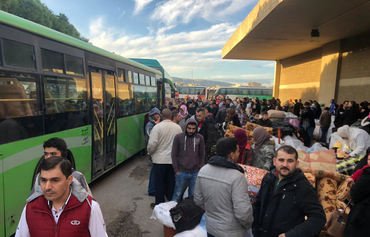Syrian births in Lebanon are being legally registered as part of a process that will eventually enable these children to return to Syria with their families without incident, Lebanese and international officials told Al-Mashareq.
The vast majority of refugee families with children born in Lebanon have taken the first step in this process; obtaining birth certificates issued by a midwife or hospital and having them authenticated by the mukhtar's office.
A further 52% have taken the next step, registering birth certificates with the Ministry of Interior’s personal status department and Lebanese municipalities.
This step will help establish the nationality of Syrian newborns, and will make it easier for them to prove their parentage when their families decide to return.
"God blessed me with two sons," said Suleiman Mohammed Nawfal Nasr, a Syrian refugee from Hama who resides in Mazraat Yachouh, Mount Lebanon.
"My son Mohammed was born in Hama three years ago, as my wife was still there at the time, while my second son, Abdul-Majeed, was born in Lebanon 13 months ago," he told Al-Mashareq.
"I immediately obtained a birth certificate for him from the state-registered midwife, and had it authenticated by the mukhtar," he said. "I will complete all legal procedures with the Lebanese ministries in order to register him in Syrian [personal status] departments."
"I am completing all these procedures in order to make my return to Hama with my entire family proper from the legal standpoint," he added.
Paving way for return
Minister of State for Refugee Affairs Mouin al-Merehbi told Al-Mashareq the registration of Syrian births in Lebanon "is ongoing".
Syrian refugees must register births within one year.
"However, a problem remains in the case of children who are older than 1, as they are difficult to register," he said.
The ministry has been working "to amend the personal status law, specifically the provision on persons who are 1 year old and above, to remove them from the list of unregistered births and put them instead on a special list", he said.
This will make it easier for them to obtain identity documents that will pave the way for their return, al-Merehbi added.
UN High Commissioner for Refugees (UNHCR) data indicate there were roughly 130,000 children born to Syrian refugees in Lebanon registered over the past six years, some of whom have since returned to Syria.
"We are encouraging the displaced to register their births, and are working to overcome some of the problems by co-operating with the Ministry of the Interior to find legal solutions to facilitate their registration as part of the government’s general policy of dealing with the Syrian displacement to Lebanon," he said.
Raising awareness
The UNHCR has been working with various ministries to facilitate the registration of Syrian births, said UNHCR assistant public information officer Lisa Abu Khaled.
It offers assistance to parents to help them obtain supporting documents, she told Al-Mashareq, and also helps to raise awareness about the importance of registering children and to inform parents of the correct process for doing so.
This involves obtaining birth certificates from midwives or hospitals, having them authenticated by local officials, and registering them with the Ministry of Interior and the Ministry of Foreign Affairs, she said.
"We also provide legal support to refugees who run into problems registering their marriage and/or child births," Abu Khaled said.
UNHCR statistics show that 93% of Syrian refugees obtained identification documents, such as an authenticated birth certificate for their children, in 2016, compared to 87% in 2015, she said.
Statistics also show that "52% of the births were registered with the Ministry of Interior in 2016, compared to 38% in 2015", she added.
This can be attributed to the growing awareness among the refugee population of the need to register their children's births, she said, which will facilitate their return and spare them future legal problems.
Helping refugees return
Justice for All, a Lebanese civil society organisation with no political affiliation, has been helping Syrian refugees to register the birth of their children in Syria.
Founder Linda Boulos told Al-Mashareq that Justice for All has been working with the Syrian Family Reunification organisation, which opens a file for newborns in Syria after receiving legal documents from its Lebanese counterpart.
"We initiated this pilot experiment as part of a project titled 'Help a displaced person return home'," she said.
"We have begun registering the applications of a number of families, 2,000 families to date, and await an official notice from the Ministry of Interior and the municipalities to proceed officially," she said.
"We reconcile the status of displaced [Syrians] who come to us by obtaining a Lebanese residence permit for them and birth certificates for their newborn babies, and then send them to the Syrian organisation, which registers them with the official Syrian departments," she said.
The registered children now have "identity documents and cards and passports that prove their Syrian nationality and allow their families return safely to Syria whenever they wish", Boulos said.

![Mohammed and Abdul-Majeed Nasr, the children of Syrian refugees, play in their house in Mazraat Yachouh, Mount Lebanon. The youngest son was born in Lebanon. [Nohad Topalian/Al-Mashareq]](/cnmi_am/images/2017/11/08/10294-Lebanon-refugee-children-600_384.jpg)







Peace be upon you! I hope the papers of my family and children will be legal.
Reply2 Comment(s)
Hassan Mohammed al-Zoebi. I’ve submitted the certificate of my son to the UN office. Four months later, I was told I do not fit the requirements [to receive aid], and they told me to do it at my own expense. I haven’t been sponsored by the UN. Please examine my file because I have two children and our situation is tough.
Reply2 Comment(s)